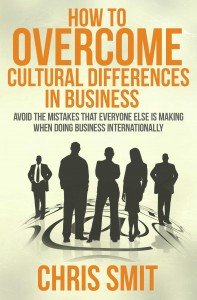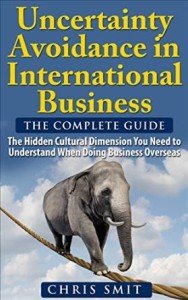Let’s start with a definition of Long Term Orientation, so we’re all on the same page:
“A national culture attribute that emphasizes the future, thrift and persistence.“
It’s likely that you can find more definitions, but this one makes sense and is compact. The way this definition is phrased is from a relatively high score on this dimension.
Why Is Long-Term Orientation So Difficult to Understand?
During cultural awareness training, I hardly ever go over this dimension.
I usually stick to the first four main dimensions of culture (power distance, individualism, masculinity, and uncertainty avoidance). Why? Because, in my experience, long-term orientation does not add much practical information or applicability when it comes to understanding different cultures.
Only in very special circumstances, do I address this dimension, or where it really makes sense (I once did a workshop in Tokyo, with a large group of Japanese and a large group of Westerners; there it made sense!).
Here’s a typical long-term orientation riddle example, that usually leads to a lot of discussion and confusion:
“If a tree falls in the Forrest, and there is no one there, nor is it being recorded or broadcast in any form or shape. Does it make a noise?”
- A typical low long-term orientation scoring answer could be: “Yes, of course, it makes a noise. It will always make a noise…”
- A typical high-scoring long-term orientation answer could be: “I don’t know…”
The Origins Of Long-Term Orientation
When prof. Geert Hofstede first constructed his first four dimensions of cultural differences, he recognized that he too was influenced by his own Dutch culture, which he could not take out of the “cultural equation“.
Indeed the Canadian Michael Bond (working in Hong Kong at the time) re-ran Hofstede’s questionnaires (this was in the mid-70s) and found significant differences in certain answers to questions by people with an Asian background (=culture), leading to the addition of this 5th dimension Long Term Orientation or LTO.
Characteristics of LTO
A number of characteristics of relative high scoring countries are:
- persistence (perseverance)
- ordering relationships by status
- the possibility of having many truths (depending on time and context)
- thrift
- having a sense of shame
On the other side of the dimension (low score) these characteristics:
- personal steadiness and stability
- short-term orientation; short feedback cycles
- respect for tradition
- reciprocation of greetings, favors, and gifts
- Absolute truths (e.g. law of gravity)
Scores of LTO
Below is a list of countries and their respective scores on this dimension. One reason for me to leave this dimension out when giving a cultural awareness training is not all scores are known in all countries.
- Australia 31
- Bangladesh – 40
- Brazil – 65
- Canada – 23
- China – 118
- Germany FR – 31
- Great Britain – 25
- Hong Kong – 96
- India – 61
- Japan – 80
- Netherlands – 44
- New Zealand – 30
- Nigeria – 16
- Pakistan – 00
- Philippines – 19
- Poland – 32
- Singapore – 48
- South Korea – 75
- Sweden – 33
- Taiwan – 87
- Thailand – 56
- USA – 29
- Zimbabwe – 25
Geographical Borders
The “geographical border” of relatively high and low scores on this dimension runs right between India (61) and Pakistan (00); then upward around India, China/Russia.
A strong correlation with this is the dominating religions. Whereby Pakistan is predominantly Muslim (One God, One Book) and India is predominantly Hindu (multiple Gods, not clearly one book). Following the “lines of Religion” is also a good indicator of low and high scores on this dimension.
Finally
If you’re puzzled by reading all this, you’re probably not alone.
If you’re not raised within an Asian context all of the above doesn’t mean much to you (as it doesn’t to me). And that’s OK.
The first four, or four main dimensions of culture are plenty enough to explain most (business) phenomena when it comes to cultural differences and diversity.
An article about examples of long-term orientation can be found here.
Here’s a specific article about doing business in Asia.
Examples of the dimension hierarchy or power distance can be found here.
Get a Taste of How Chris Presents, Watch his TEDx Talk
 Call Direct: +32476524957
Call Direct: +32476524957
 European Office (Paris) Whatsapp: +32476524957
European Office (Paris) Whatsapp: +32476524957
The Americas (USA; Atlanta, GA; también en Español): +1 678 301 8369
Book Chris Smit as a Speaker
If you're looking for an Engaging, Exciting, and Interactive speaker on the subject of Intercultural Management & Awareness you came to the right place.
Chris has spoken at hundreds of events and to thousands of people on the subject of Cultural Diversity & Cultural Competence.
This is What Others Say About Chris:
- “Very Interactive and Engaging”
- “In little time he knew how to get the audience inspired and connected to his story”
- “His ability to make large groups of participants quickly and adequately aware of the huge impact of cultural differences is excellent”
- “Chris is a dedicated and inspirational professional”
In addition, his presentations can cover specific topics cultural topics, or generally on Cultural differences.
Presentations can vary anywhere from 20 minutes to 2 hours and are given worldwide.
Book Chris now by simply sending an email. Click here to do so.
Read more about what Chris can do for you.
- Percentage of People Rating a Presentation as Excellent 86%
- Rating the Presentation as Practical 89%
- Applicability of Chris' presentation 90%
About Peter van der Lende

Peter has joined forces with Culture Matters.
Because he has years and years of international business development experience joining forces therefore only seemed logical.
Being born and raised in the Netherlands, he has lived in more than 9 countries of which most were in Latin America.
He currently lives in Atlanta, Georgia (USA) with his family.
You can find out more at https://expand360.com/
Or find out what Peter can do for you here.
- Embassies and Cultural Competence - 22 October 2024
- Sport and Culture; Why the Dutch Never Make it to the Finals - 8 October 2024
- 181 Culture and Real Estate with Julie Condliffe - 1 October 2024



 Call Direct: +32476524957
Call Direct: +32476524957 European Office (Paris) Whatsapp: +32476524957
European Office (Paris) Whatsapp: +32476524957
I certainly include this parameter … is Spain, Catalonia and the Basque country are LTO whereas many other parts are much more STO (mind you as a Chinese student said to me “compared to us, Europeans have NO idea of what LTO means!)
The current economic crisis is, in part, the result of STO and the ‘get rich quick’ syndrome. I believe it is probably hard to classify by country; however I do believe it is an interesting dimension to remember and to study as it affects negotiation briefs, attitudes, communication etc
Hi Anne,
Thanks for leaving a comment.
As with anything related to cultural differences: it only makes sense by the grace of comparison (which you do!) when it comes to spain. It’s an interesting observation.
I agree fully with your Chinese student: we westerns have indeed NO idea what LTO means, and might very well be confusing it with other things (and cultural dimensions).
I also agree with you that you can attribute some of the US economic crisis to a low score on LTO. But also on a high MAS score (“winning”) and a low Uncertainty Avoidance score (“I’m willing to take the risk (to win)”).
Professor Smit,
Hi, I don’t understand quite well about some of the traits of shor-term orientation culture. One of the trait is that people in this kind of culture have a deep appreciation for tradition, personal steadiness and stability. USA belongs to short-term orientation culture, but they also belong to the low uncertainty avoidence culture. It means that they are not afraid of changing and they consider change in life a normal thing. China belongs to the high uncertanty avoidence culture and they are afraid of changing and they hope to have a steady life. The traits of these two dimensions are contradictory. Would you please explain this to me/. THank you!
Kathy
CHina
Hi Kathy,
Thank you for your comment!
First of all, I’m not a professor 😉
Second to your question:
Both US and China score Low on the Uncertainty Avoidance dimension of Hofstede.
US scores low on LTO, China scores high on this dimension.
I agree with you that Americans “like” change. Or, put differently, Americans are not risk averse. Neither are Chinese (both score low on Uncertainty Avoidance).
Chinese might not “change” as fast as Americans for other reasons as well: because of what the group will say (Collectivism), or what the consequenses will be from their boss (high Powerdistance).
It’s important to look at a culture and it’s dimensions as a whole, not through one dimension only.
Re-read a number of the examples I’ve mentioned earlier and in an other post on this LTO dimension.
Please let me know if my comment clarified your question somewhat.
I am currently doing culture based research, and I am wondering where you obtained your LTO score for Zimbabwe? I have been unable to find score on any of the dimensions for Zimbabwe. In addition, I have also been unable to find an LTO score for South Africa (another country in my study). Thanks in advance.
Hi Tendai,
Thank you for your comment!
You’re correct that there are no scores for Zimbabwe not LTO for SA.
However, you can use Angola’s scores as a reference for Zimbabwe. Although the two countries are of course different, in terms of their “cultural trend” they are comparable (not identical!).
LTO for SA will be low, as it is for the whole continent of Africa.
Hope this helps!
Am I missing something here… Because I have studied in China and even Chinese teachers used to say that Chinese people like traditions, are afraid of losing their face and favors and gifts are very usual in business. So HOW is it possible that all the characteristic I mentioned are related to short term orientation and China is top country in LTO.
Hi Annmarie,
Thank you for your comment!
You’re not missing anything at all.
My assumption is (and sorry if I’m wrong) that you’re not Chinese yourself.
The thing is this 5th Dimension is very difficult to understand for non-Chinese (Asians in general). Westerns have no concept of “Many Truths”. When the tree falls in the forest and there is no one there, of course it makes a noise. This is how we think (including myself).
The characteristics you mention in your comment are pretty much all related to the Collective aspect of Chinese society. Not to LTO.
As I said before at the beginning of this post, I hardly ever explain this dimension. For one reason that it is difficult for me to comprehend emotionally, and second that it usually leads to more confusion than to more clarity.
Hope this makes a bit of sense!
I would like to enquire how LTO affect the uptake of insurance for people of a particular culture. I am currently doing a study on health financing in Zimbabwe and one thing that I have found is that a lot of people in Zimbabwe do not value insurance in general and health insurance in particular. Can this be associated with a low LTO score or is it more to do with uncertainty avoidance dimension?
Hi Blessing,
Thank you for your comment.
I don’t think LTO has to do anything with valuing insurance to be honest.
If any dimension has an influence I think it would indeed be Uncertainty Avoidance.
Hi UAI scoring countries would then put a higher value on insurance.
But you observe just the opposite.
Which in my eyes, has everything to do with the financial status and capabilities of most Zimbabweans.
In other words, it is not top of mind because other things take priority currently.
Hope this helps.
please tell me why Pakistan is zero on hosted cultural dimension of longterm orientation
The numbers used by Prof. Hofstede are supposed to be a relative scale. Since this is a relative scale it could go below 0 and over 100.
In the case of Pakistan being 0 on LTO says nothing in and by itself. If you compare one country to the other, both get meaning (relative comparison). E.g. Pakistan scores 0, India 61. This can be attributed to the fact that Pakistan has a single dominating religion (Islam) with one God/Prophet and one book (Quran) . While India has many Gods and many books.
PS a score (any score for that matter) is neither good nor bad.
Hope this helps.
Hi Chris,
Can I apply the long-term orienatation on the bahaviour of organizations?
Hi Jack,
Thanks for your comment.
To some extent you could.
What period of time does the average business plan span in the Western world? The answer is anywhere between 1 to 3 years. 5 years max.
In high-scoring countries like Japan and Korea, there are companies that take a longer term vision. There you can find business plans that span a period of decades even.
Hope this short answer helps.
Kind regards,
Chris
Comment hola una pregunta chris
cual es la diferencia entre america latina y europa occidental entre long term y short term? una comparacion entre las dos
Hola Maria,
Gracias por su mensaje.
Mi español no es tan mal, pero no es sufficiente bueno para enscribir una repuesta en español. Así que voy a sigar en Engles. ¿Vale?
Your question is about the difference between Latin America and Western Europe.
There is not much difference between the two continents. Basically, you can say that all Western, African, and the Americas score relatively low on this Long Term Orientation dimension compared to Asian countries. With India being the “first” Asian country if you go east on the map.
The possible only noteworthy exception is the Dutch. Of all low scoring countries, the Dutch score relatively the highest. Still significantly lower than Asian countries, but still high compared to other low scoring countries.
There’s a saying that says that the Dutch are the Chinese of the West…
😉
Hope this help.
¡Saludos!
Chris